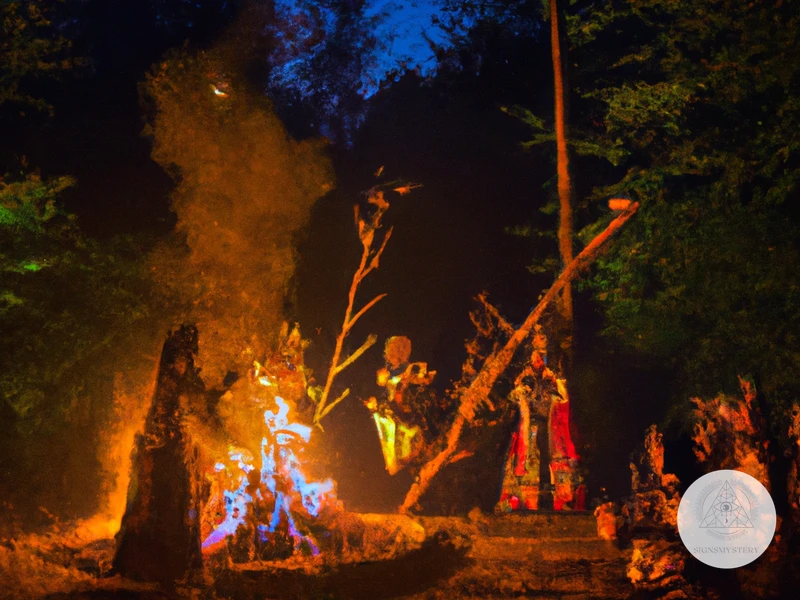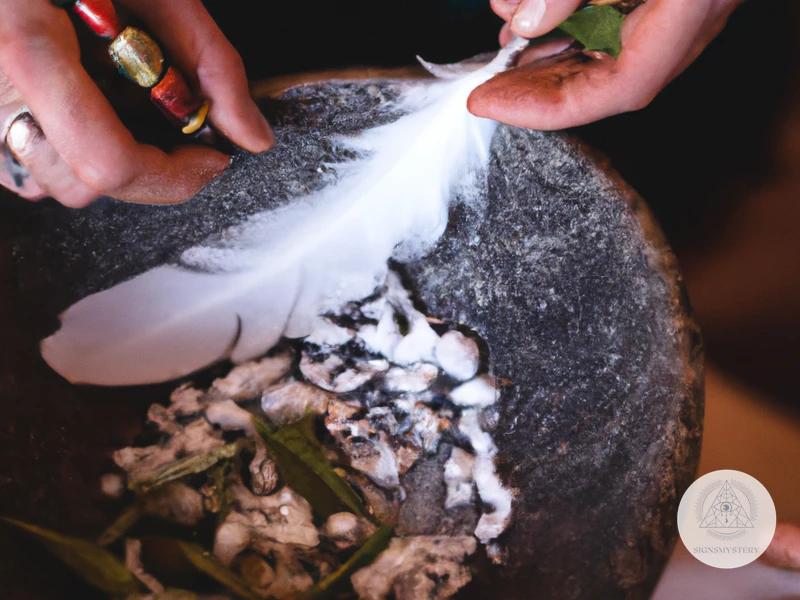Neo-Shamanism is a spiritual practice that draws inspiration from various indigenous cultures from all around the world. This spiritual movement has gained a lot of popularity in recent years, with an increasing number of people turning towards shamanism for personal growth and healing. However, the rise of Neo-Shamanism has also brought to light some serious ethical concerns. One of the most critical issues surrounding Neo-Shamanism is cultural appropriation and the misuse of indigenous practices. In this article, we will explore the origins of Neo-Shamanism, define cultural appropriation, discuss its harmful impact, and provide best practices for ethical Neo-Shamanism.
What is Neo-Shamanism?

Neo-shamanism is a modern spiritual practice that draws inspiration from ancient shamanic traditions. It seeks to connect individuals with the spiritual realm and the natural world through the use of various techniques, such as drumming, chanting, ecstatic dancing, and the use of hallucinogenic plants or substances. Neo-shamanism is considered a new age movement and differs from traditional shamanism in several ways, including its emphasis on individual experience and experimentation, the lack of formal training or initiation, and the incorporation of elements from other spiritual traditions.
Some key characteristics of Neo-Shamanism include:
- The belief in the existence of multiple spiritual dimensions or realms beyond the physical world.
- The practice of journeying to these realms to seek guidance, healing, and wisdom from spirits or entities.
- The use of various tools and techniques, such as chanting, drumming, smudging, and the use of psychoactive substances, to alter consciousness and facilitate spiritual experiences.
- The focus on personal experience, experimentation, and self-discovery, rather than adherence to a specific dogma or doctrine.
While neo-shamanism is a relatively new practice, it has gained a significant following and has influenced the spiritual beliefs and practices of many individuals in the Western world. However, its origins, legitimacy, and ethical implications have been the subject of debate and criticism.
Defining Neo-Shamanism
Neo-shamanism refers to the contemporary practices of shamanism that have emerged in Western cultures. It is heavily influenced by teachings and beliefs from various Indigenous cultures around the world. However, it is important to note that neo-shamanism is not the same as traditional shamanism and the two practices should not be conflated. Neo-shamanism has been characterized by its focus on personal development, alternative healing techniques, and spiritual exploration. While neo-shamanism has become increasingly popular in recent decades, it has also been met with criticism and controversy. To better understand this modern form of shamanism, it is essential to compare and contrast it with traditional shamanic practices as well as to examine its ethical concerns and best practices.
Origins of Neo-Shamanism
Neo-shamanism is a modern-day spiritual practice that draws inspiration from traditional shamanism. Unlike traditional shamanism, neo-shamanism does not necessarily involve taking part in an indigenous community.
The origins of neo-shamanism can be traced back to the 1960s and 70s when Westerners became interested in shamanism. Several books, such as Carlos Castaneda’s The Teachings of Don Juan: A Yaqui Way of Knowledge, were published that introduced shamanic practices to a wider audience.
During the same period, a counterculture movement emerged in which people dropped out of mainstream society to explore alternative lifestyles, spirituality, and culture. This led to many Westerners traveling to South America and other parts of the world to take part in traditional shamanic ceremonies.
As the practice gained popularity, Westerners adapted traditional shamanic practices to suit their own needs and cultural backgrounds, leading to the development of neo-shamanism. Today, neo-shamanism draws on a range of influences, including indigenous practices, modern psychology, and spirituality.
It is important to note that while neo-shamanism may not involve direct participation in an indigenous community, there are still ethical considerations to keep in mind. It is crucial to understand the difference between cultural appreciation and appropriation, and to approach indigenous practices with respect and sensitivity. To learn more about the differences between traditional and neo-shamanism, click here.
Appropriation and Misuse of Indigenous Practices
Cultural appropriation is when an individual or group takes aspects from a culture that is not their own without permission or respect for its significance to that culture. When it comes to spirituality, cultural appropriation can happen when individuals from outside of a culture take part in sacred practices or ceremonies without fully understanding their cultural context.[1]
Neo-Shamanism is often criticized for appropriating Native American, Indigenous, and other cultural practices for profit or personal gain. This could be seen in the use of sacred objects such as feathers or headdresses, performing ceremonies without proper permission, or using traditional songs or chants without understanding their cultural meaning.[7] For instance, the use of the term “smudging” to describe the burning of sacred herbs in a ritual context, which is a term that exclusively refers to Indigenous North American practices.[2]
Appropriation can have a harmful impact on Indigenous communities as their sacred practices are commodified and stripped of their cultural significance. When individuals take part in these cultural practices without authorization or understanding of their meaning, they are perpetuating a cycle of cultural exploitation that has existed for centuries. Aside from that, their actions can also lead to the erasure of Indigenous practices and deprive Indigenous peoples of ownership over their culture and traditions. Appropriation can also have harmful psychological effects upon Indigenous peoples who see their traditions disrespected and misused by non-Indigenous individuals.[5]
Neo-shamans should be aware of the cultural sensitivity and the importance of respecting other cultures and communities’ spirituality. Rather than seeking out other cultures or copying their practices, individuals interested in Neo-Shamanism should focus on developing their own spiritual practices and understanding of shamanism in general. Additionally, Neo-Shamans should make sure to receive permission from the relevant cultural communities, elders, or leaders before using any of their practices. It’s also vital to understand the cultural context and meaning behind the practices to ensure their significance and respect for the community.[6]
Ultimately, it is crucial for neo-shamans to practice cultural appreciation rather than cultural appropriation. This means appreciating other cultures and being sensitive to their spiritual beliefs and practices without taking ownership, commodifying, or exploiting them for personal gain. [0]
What is Cultural Appropriation?
Cultural appropriation is the act of taking aspects of someone else’s culture without understanding or respecting their significance. It is important to acknowledge and understand the difference between cultural appreciation and cultural appropriation. Cultural appreciation involves showing respect and admiration for a culture by educating oneself, finding common ground, and collaborating with members of that culture. Cultural appropriation happens when aspects of a culture are used out of context or without permission and understanding of the culture’s significance. For example, in neo-shamanism, practices of indigenous cultures can be appropriated without regarding their deep spiritual roots, causing harm and misrepresentation. As a neo-shaman, it is essential to learn about and respect the cultural origins and not simply take elements for one’s own benefit.
Examples of Appropriation in Neo-Shamanism
Examples of appropriation in Neo-Shamanism are numerous and varied. One common form of appropriation is the adoption of Indigenous ceremonial dress and headdresses by non-Indigenous individuals in their shamanic practices. This is harmful to Indigenous communities as these ceremonial items hold spiritual and cultural significance. Utilizing them outside of their traditional context can be seen as disrespectful and diminishes the cultural value of these objects.
Another example of appropriation is the use of Indigenous songs, chants, and drumming in non-Indigenous shamanic practices. While these practices have been popularized in the Neo-Shamanism movement, they are important parts of Indigenous cultures that should not be taken out of context. Non-Indigenous individuals utilizing these practices without permission or understanding of their cultural significance is harmful and disrespectful to Indigenous communities.
Neo-Shamans have also been known to co-opt sacred plant medicines used in Indigenous cultures such as ayahuasca and peyote. The misuse of these substances can be dangerous without proper understanding and guidance from experienced Indigenous healers. Additionally, the commercialization of these plant medicines can be seen as exploitation of Indigenous cultures.
It’s important for those practicing Neo-Shamanism to be aware of these examples of appropriation and take steps to avoid them. This can be done by educating oneself about Indigenous cultures and their practices, seeking permission and guidance from Indigenous communities when incorporating elements of their practices, and refraining from commercializing or exploiting Indigenous cultures for personal gain.
For more information about the differences between traditional and neo-shamanism, check out this comparison. And if you’re interested in the potential benefits and risks of Neo-Shamanism, read this article on the subject. It’s important to find common ground between traditional and Neo-Shamanism, as discussed in this piece.
The Harmful Impact of Appropriation
The harmful impact of appropriation in Neo-Shamanism cannot be overstated. The practice of cultural appropriation is not only unethical, but also perpetuates systemic oppression of marginalized communities. By taking sacred practices and symbols out of their cultural context and using them for personal gain, Neo-Shamans are devaluing and disrespecting the cultures that they are taking from. This can lead to erasure and the further marginalization of already vulnerable communities.
One of the negative impacts of cultural appropriation in Neo-Shamanism is the erasure of the true origins and meanings of indigenous practices. When Indigenous practices are taken out of their original contexts and used for commercialized or individualistic purposes, the true intentions and meanings behind them are often lost or distorted. This not only disrespects the culture the practice comes from but also devalues the spiritual significance behind that practice.
Another harmful impact of appropriation in Neo-Shamanism is the misrepresentation and exoticization of Indigenous cultures. When those from outside of a culture appropriate and commodify aspects of that culture, it can perpetuate stereotypes and distortions of that culture to make it more consumable for outsiders. This can lead to the exoticization of indigenous culture, and the promotion of misleading and harmful stereotypes that further marginalize indigenous communities.
Cultural appropriation can also further systemic oppression and perpetuate power imbalances. When dominant groups appropriate cultural practices and symbols from marginalized communities, they are taking something without recognition of the history of systemic oppression that has taken place and is still taking place. The appropriation of Indigenous practices can be an extension of that oppression, further taking away from the power, voice, and autonomy of Indigenous communities.
Cultural appropriation in Neo-Shamanism can have far-reaching and harmful impacts. It perpetuates systemic oppression of marginalized groups, erases the true meanings and intentions behind Indigenous practices, misrepresents and exoticizes Indigenous cultures, and perpetuates power imbalances. It is crucial that Neo-Shamans recognize and take responsibility for the potential harm that can come from their actions, and take steps to learn and uphold best practices for ethical engagement with Indigenous practices and communities.
Ethical Concerns and Best Practices for Neo-Shamanism

Neo-shamanism is a practice that has gained popularity in recent years, and with this popularity have come growing concerns about appropriation and misuse of indigenous practices. It is, therefore, important for those who practice neo-shamanism to be mindful of the ethical implications and to practice best practices.
One of the main ethical concerns in neo-shamanism is cultural appropriation, which involves taking elements of a culture without permission or respect for the community from which they come. This can manifest in the use of indigenous practices without proper understanding or context, or the commodification of sacred spiritual practices for profit. Another concern is the lack of regulation within the neo-shamanic community, which can lead to individuals offering healing services without proper training or expertise, which puts vulnerable clients at risk.
There are several best practices that individuals practicing neo-shamanism can adopt to mitigate these ethical concerns. Firstly, it is important to approach indigenous practices with respect and a willingness to learn. Seek out elders or representatives from the culture you are interested in and ask for permission and guidance. Secondly, it is essential to receive proper training and education from qualified practitioners before offering any form of healing services. This ensures that you understand the practices you are working with and can better serve your clients.
Another important best practice is to avoid appropriation and commodification by not selling sacred spiritual practices, artifacts, or ceremonies. It is essential to view these practices as part of a living culture, rather than something that can be bought or sold for profit. Additionally, it is important to be mindful of power dynamics when working with clients. Make sure you have clear boundaries and seek consent before engaging in any form of spiritual practice with a client.
Conclusion
Neo-shamanism has the potential to be a powerful tool for healing and self-discovery, but it is essential to approach it with ethical considerations in mind. By practicing best practices and being mindful of the potential for appropriation and misuse, we can honor the culture and traditions that originated these practices while also benefiting from their wisdom and healing power. Remember, healing is a responsibility that must be approached with respect, integrity, and
Subscribe to Our Newsletter
Sign up to receive the latest news and updates.
Ethical Concerns in Neo-Shamanism
Ethical concerns within neo-shamanism arise from the appropriation and misuse of indigenous practices, which can have a harmful impact on marginalized communities. It is important for neo-shamans to approach these practices with respect and understanding, recognizing the power dynamics at play and prioritizing consent and collaboration with indigenous communities. Neo-shamans should implement best practices such as integrating traditional teachings, prioritizing accessibility and inclusivity, and avoiding commodification or commercialization of practices. By prioritizing these ethical considerations, neo-shamans can engage in a more informed and respectful use of indigenous practices within their spiritual practice.
Best Practices for Neo-Shamanism
Best Practices for Neo-Shamanism: Neo-shamanism has become a popular practice in the western world, and with that popularity comes the responsibility to approach it in an ethical and respectful manner. The following are some best practices for neo-shamans to consider:
1. Do your research: Before incorporating any indigenous practices into your own practice, it is important to thoroughly research the culture and traditions you are drawing from. Consult the appropriate sources and experts to ensure that your practices are respectful and appropriate.
2. Seek permission: If you are seeking to work with a specific indigenous community’s practices or knowledge, it is important to seek their permission and guidance. This can be done by reaching out to community leaders or elders and showing respect for their traditions and way of life.
3. Avoid commercialization: Avoid commodifying indigenous practices for financial gain or profit. Respect their cultural and spiritual significance, and avoid using them for personal gain.
4. Avoid cultural appropriation: Cultural appropriation can lead to harm and offense to the communities that originate from the traditions being borrowed. It is important to understand the cultural power dynamics involved and to avoid practices that are disrespectful or appropriative.
5. Focus on personal growth: Focus on your own personal growth and spiritual journey rather than trying to copy indigenous practices. Seek to incorporate them respectfully and meaningfully into your own practice, rather than trying to replicate an entire tradition.
6. Honor and respect the cultures: Express gratitude and respect for the cultures and practices that you are drawing from. Acknowledge the origins of the practices and their deeper meaning and cultural context.
By following these best practices, neo-shamans can work in an ethical and respectful manner, while gaining the benefits of a unique spiritual practice that can lead to a deeper understanding of oneself and the world around them.
Responsibility for Neo-Shamans
Neo-shamans have a special responsibility to approach their practices with respect, sensitivity, and humility. It is essential that they acknowledge their own position as outsiders to Indigenous cultures and recognize the power dynamics at play. Here are some key considerations for neo-shamans who wish to engage in their practices ethically:
neo-shamans must recognize that they hold a position of power and privilege as non-Indigenous people, and that their engagement in Indigenous practices has the potential to exploit and cause harm to Indigenous communities. They should approach their practices with a stance of humility, recognizing the complexity and depth of the cultural traditions they are engaging with.
Key considerations:
- Recognize and respect the power dynamics at play
- Approach practices with humility and respect for Indigenous cultures
Neo-shamans must also be mindful of their interactions with Indigenous communities. They should not purport to represent or speak on behalf of these communities, but instead listen to and learn from their experiences. Neo-shamans should aim to build respectful and meaningful relationships with Indigenous people, and support their efforts to protect and promote their cultural heritage.
Key considerations:
- Do not claim to represent Indigenous communities
- Listen to and learn from Indigenous voices
- Support Indigenous efforts to protect and promote their cultural heritage
It is important for neo-shamans to approach their practices with humility and respect for Indigenous cultures and acknowledge their own position as outsiders. By recognizing the power dynamics at play and building respectful relationships with Indigenous communities, neo-shamans can engage in their practices ethically and responsibly.
Recognizing Power Dynamics
When pursuing neo-shamanic practices, it is important to recognize power dynamics at play between yourself as a practitioner and any individuals or communities from which you may be drawing inspiration or knowledge. Power dynamics refer to the ways in which power is distributed and exerted among different individuals or groups. In the context of neo-shamanism, practitioners who appropriate indigenous practices risk perpetuating a power dynamic in which they hold power and authority over the indigenous communities from which these practices have been taken. It is important for neo-shamans to remain aware of this power dynamic and to engage in their practices in a respectful and responsible manner that honors indigenous beliefs and practices. This may include seeking out relationships with indigenous communities, seeking permission before using indigenous knowledge, and engaging in a continual process of learning and listening.
Interacting with Indigenous Communities
Interacting with Indigenous Communities is an essential part of being a responsible Neo-Shaman. Most Neo-Shamanic practices originate from Indigenous cultures, so it’s vital to interact with these communities respectfully and with intention. Here are some best practices to follow when interacting with Indigenous communities:
| Tips for Interacting with Indigenous Communities |
|---|
| 1. Educate yourself: Before engaging with Indigenous communities, learn about their beliefs, culture and way of life. This knowledge will show respect and appreciation for their history and culture. |
| 2. Build relationships: Respectful relationships and trust take time and continuous communication. Honour these relationships by being honest, transparent and remembering that there are real people behind the culture you are engaging with. |
| 3. Seek permission: Before using any knowledge or practices that are not your own, it is always important to get permission from the community or cultural leaders. |
| 4. Learn from Indigenous elders: Indigenous elders can provide valuable insight into the practices and traditions of their culture. Respectfully seek their knowledge and guidance to ensure the correct use of Indigenous practices. |
| 5. Listen: Your intention should be to learn and honour, not to teach or co-opt. Listen respectfully to what Indigenous people have to say, and ask questions thoughtfully without interrupting or assuming. |
| 6. Acknowledge and give back: Show respect and appreciation for the culture you have learned from by acknowledging and giving back. This could be in the form of financial contributions, volunteering or other means. |
Engaging with Indigenous communities respectfully is an essential part of ethical Neo-Shamanism. Remember to approach these interactions with humility, kindness, and a desire to learn and grow. With care and intention, Neo-Shamanism can be practiced with respect and cultural appropriateness.
Conclusion
In conclusion, it is important to recognize the ethical concerns surrounding the appropriation and misuse of indigenous practices in neo-shamanism. While neo-shamanism can provide individuals with a sense of spiritual connection and purpose, it must be practiced in a respectful and collaborative manner that avoids cultural appropriation and harm to indigenous communities.
Key to this is a recognition of power dynamics and the importance of listening to the voices of indigenous people. Neo-shamans must also prioritize education and awareness of the history and cultural significance of the practices they are engaging in.
By following these best practices and embracing a spirit of humility and respect, modern practitioners can participate in neo-shamanic practices in a way that is ethical and sustainable. Ultimately, this can help to foster greater cross-cultural understanding and connection while honoring the cultural roots of the practices themselves.
Frequently Asked Questions
What are some examples of indigenous practices used in Neo-Shamanism?
Some examples of indigenous practices used in Neo-Shamanism include smudging, sweat lodges, vision quests, and the use of various plant medicines.
What is the difference between traditional shamanism and Neo-Shamanism?
Traditional shamanism refers to the spiritual practices of indigenous cultures, while Neo-Shamanism is a modern interpretation of these practices that is not rooted in any specific cultural context.
Can non-indigenous people participate in Neo-Shamanism practices?
Yes, non-indigenous people can participate in Neo-Shamanism practices, but it is important to approach these practices with respect and to avoid appropriating indigenous cultures.
How can Neo-Shamans ensure they are not appropriating indigenous cultures?
Neo-Shamans can ensure they are not appropriating indigenous cultures by educating themselves about the cultural significance of the practices they are using, seeking permission from indigenous communities, and involving indigenous voices in their practice.
What are some harmful consequences of cultural appropriation in Neo-Shamanism?
Cultural appropriation in Neo-Shamanism can harm indigenous communities by erasing or trivializing their cultural practices and perpetuating harmful stereotypes. It can also lead to the exploitation of indigenous knowledge and resources by non-indigenous people.
What ethical concerns should Neo-Shamans be aware of?
Neo-Shamans should be aware of ethical concerns such as cultural appropriation, the misuse of indigenous practices, and the potential for harm to indigenous communities and their cultural heritage.
What are the best practices for Neo-Shamans to follow?
Best practices for Neo-Shamans include educating themselves about the cultural significance of the practices they are using, seeking permission from indigenous communities, and approaching these practices with respect and humility. They should also be aware of power dynamics and avoid exploiting indigenous knowledge and resources.
What role do power dynamics play in Neo-Shamanism?
Power dynamics play a significant role in Neo-Shamanism, particularly in the relationship between non-indigenous Neo-Shamans and indigenous communities. It is important to recognize and address these power dynamics in order to avoid exploitation and harm.
How can Neo-Shamans interact with indigenous communities in an ethical way?
Neo-Shamans can interact with indigenous communities in an ethical way by seeking permission, involving indigenous voices in their practice, and respecting their cultural heritage and traditions. They should also be mindful of power dynamics and avoid exploiting indigenous knowledge and resources.
What is the importance of recognizing the origins of Neo-Shamanism?
Recognizing the origins of Neo-Shamanism is important because it sheds light on the cultural appropriation that has occurred and the potential harm that can be caused to indigenous communities. It also allows for a deeper understanding and appreciation of the cultural practices that have been appropriated.










